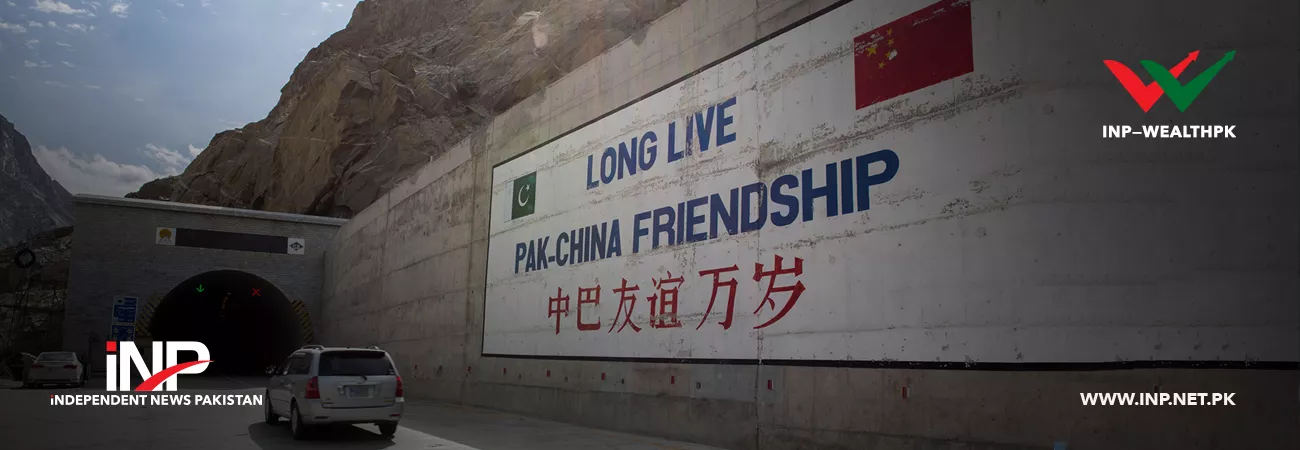INP-WealthPk
China-Pakistan Economic Corridor (CPEC) is a true reflection of the strategic partnership between China and Pakistan that works for the mutual development of both countries. The statement was made by Professor Dr Wang Yiwei, a Chinese scholar at the “International Media Dialogue on the Role of BRI in China-Pakistan Relation: Developments in the Past Decade.” The seminar was attended by academia, international journalists, scholars in the region, and industry experts who have a stake in CPEC-related projects. According to Professor Wang, the strategic partnership of China and Pakistan in the form of CPEC is standing on four pillars: energy, infrastructure, seaports, and development zones.
He explained that BRI whether on land or its maritime corridors is not only helpful for Xinjiang in China but will also connect Central Asia to the Indian Ocean. For Pakistan, he said BRI will prove to be a gamechanger since Pakistan will be able to reduce inequalities in its North-South axis. “Pakistan will be able to better industrialize because of integration and easy movement of peoples,” he said. “The future projects of the BRI will open up access to Afghanistan and all other nations of the South Asian region. This will allow for the achievement of the goals of the 2030 Sustainable Development Agenda. The region will set an example.”
He also stated that the “creation of capacity to improve governance is another facet of the strategic collaboration between the two countries. Both countries are working closely together in the economic and sustainability domain. This will help the people of both countries to move into a future where standards of living are highly improved. Cultural exchanges, people-to-people contact and value creation in terms of cooperation will lift the region out of poverty. This will all be possible with better connectivity.”
BRI, he said, is undergoing a transition phase because of new risks and challenges in the Indo-Pacific region. He added that one of the bigger challenges to BRI is the phantom of uneven development between the regions which must be addressed through BRI. Therefore, he said, we need to “ensure both development and security, coordinate bilateral and multilateral relations and promote high-standard, sustainable and people-centred progress.”
At the same dialogue, Dr Fazal-ur-Rahman, Director of Pakistan Institute of China Studies in Sargodha University said that CPEC is one of those, once in a generation, decisive policy gear-shifts that the governments take to change the course of their destinies. CPEC will create employment for the locals, allow Pakistani businesses to digitize on the back Chinese technological sharing with Pakistan and create a more harmonious environment in the region. With the help of CPEC, Pakistan will fast-forward its push for economic growth and development. Pakistan has fully embraced the framework of regional connectivity for better development prospects.
Dr Tahir Mumtaz, head of the China Study Center at COMSATS University said that CPEC includes a number of initiatives in Pakistan. “One of the central pillars behind the CPEC and BRI vision is the Gwadar deep-sea port. It is the last land-stop before venturing into the Arabian sea. Gwadar port is the nexus on which the whole framework for regional connectivity rests. Regional connectivity is not possible without the development of a very sophisticated network of roads and railway tracks all the way from Gwadar to Xinjiang,” Dr Tahir said.
“CPEC has already started to attract investors and businesses into the Gwadar region and employment opportunities are already being created for the locals,” he said. Another speaker, Sabah Aslam, Executive director at Islamabad Institute of Conflict Resolution, said that “turning CPEC from a vision into a reality has been a remarkable journey. So many times it seemed that the project would get off-rails but every time both countries ensured that it continued. Investment to the tune of USD 19 billion has already been attracted with the completion of the first phase of the project.”
Reema Shaukat, Communication strategist at the Institute of Regional Studies said that “CPEC is a very ambitious undertaking of connecting regions as far off as Asia and Europe and everywhere in between. Pakistan has been lucky in this regard since it is home to the flagship project of BRI which is CPEC. Bringing Gwadar port and its approaches via sea into this equation has turned this project into an economically viable solution for both China and Pakistan.”
Credit: Independent News Pakistan-WealthPk













